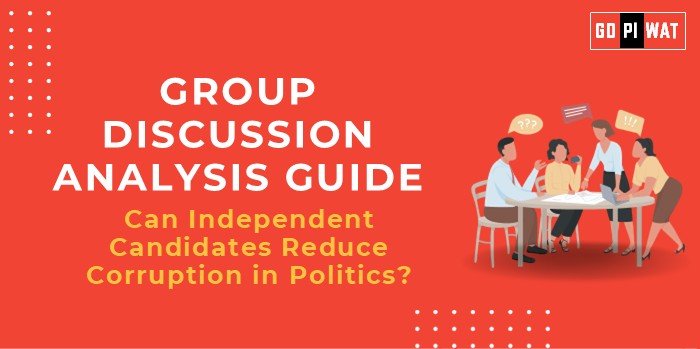📋 Group Discussion Analysis Guide
🌟 Can Independent Candidates Reduce Corruption in Politics?
🌐 Introduction
Context: Corruption undermines democracy and public trust. Independent candidates, free from party politics, are seen by some as a solution to promote transparency and integrity.
Background: The concept of independent candidates is rooted in the idea of grassroots democracy. Not tied to party lines, they are presumed to act in the public’s best interest, unhindered by partisan obligations.
📊 Quick Facts and Key Statistics
- Global Corruption Perception Index: 63% of countries scored below 50/100 (Transparency International 2023).
- Independent Candidates in India: 7% of parliamentary candidates in 2019 elections were independents; only 2% won.
- Legislative Success: Studies suggest party-aligned candidates face more pressure to toe party lines.
- Political Corruption Costs: Estimated 5% of global GDP lost annually to corruption.
- Public Sentiment: 68% of voters globally believe political parties contribute to corruption.
👥 Stakeholders and Their Roles
- Independent Candidates: Advocate for public interest without party constraints.
- Political Parties: Often accused of fostering favoritism and quid-pro-quo politics.
- Civil Society: Supports ethical candidates and monitors political behavior.
- Electoral Commissions: Ensures fair elections and empowers independents to contest effectively.
🎯 Achievements and Challenges
✔️ Achievements:
- Enhanced public trust in regions like Kerala, India, where independents succeeded.
- Less susceptible to lobbying pressures compared to party-affiliated candidates.
- Greater accountability as re-election depends solely on public support.
⚠️ Challenges:
- Lack of Resources: Independents often lack funding and organizational infrastructure.
- Systemic Barriers: Electoral systems favoring parties (e.g., first-past-the-post).
- Limited Reach: Difficulty gaining visibility without party networks.
🌍 Global Comparisons
- Success: Iceland’s Pirate Party emerged as a reformative force through independents.
- Challenges: US independents face hurdles due to two-party dominance.
📖 Structured Arguments for Discussion
- Supporting Stance: “Independent candidates, unshackled by party interests, can focus entirely on public welfare, fostering transparent governance.”
- Opposing Stance: “The lack of a robust support system and susceptibility to coercion limits the effectiveness of independents in combating corruption.”
- Balanced Perspective: “While independents can introduce accountability, systemic reforms are essential to empower their influence on corruption reduction.”
💡 Effective Discussion Approaches
- Opening Techniques:
- Quote: “Power corrupts, and absolute power corrupts absolutely” (Lord Acton).
- Case Study: “The success of independent local leaders in Scandinavian countries shows their potential to disrupt corrupt practices.”
- Counter-Argument Handling:
- Present systemic barriers as solvable problems through electoral reforms.
- Highlight successful independents like Naisula Lesuuda (Kenya) who brought transparency to governance.
🔍 SWOT Analysis
- Strengths: Free from party obligations, appeal to diverse voters.
- Weaknesses: Limited organizational resources, vulnerability to political isolation.
- Opportunities: Rise of social media for outreach, growing voter disillusionment with traditional parties.
- Threats: Co-option by dominant parties, institutional biases favoring party-affiliated candidates.
📚 Connecting with B-School Applications
- Real-World Applications: Discussions on electoral reforms, leadership challenges, and governance strategies.
- Sample Questions:
- “How can electoral reforms empower independent candidates to address corruption?”
- “Evaluate the role of independents in transforming governance in emerging democracies.”
- Insights: Study political movements and the role of independents to understand non-traditional leadership models.


